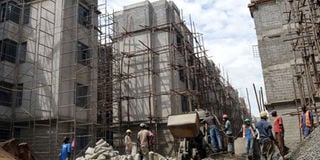Include the disabled in ‘Big four’ agenda

Affordable housing is part of President Uhuru Kenyatta's Big Four development agenda.
What you need to know:
- In Kenya, several affirmative legal measures have been put in place to address disability inclusion in development initiatives.
- According to WHO, about six million Kenyans are persons with disabilities.
Globally, disability inclusion in development is largely neglected and under-prioritised. Rarely is it included in national or international development initiatives. For example, a 2016 review of World Bank programmes, found that only two per cent of programmes were explicitly inclusive of disabled persons.
And in 2012 only three per cent of total human rights funding ($2.7 billion) was spent on disability, compared to 26 per cent on women and girls, 21 per cent on children and youth and five per cent on LGBT.
In Kenya, several affirmative legal measures have been put in place to address disability inclusion in development initiatives. Unfortunately, to date, disabled persons are still at the periphery of development.
CHRONIC CONDITIONS
For example, last year the Treasury released a report which indicated that of the Sh50.1 billion worth of tenders that the government awarded between 2014 and 2017 to the enterprises run by disadvantaged groups, disabled persons’ enterprises got only Sh1.3 billion (2.6 per cent), youth Sh22.2 billion and women Sh26.6 billion.
Globally, an estimated one billion people are disabled persons. This number is likely to increase in the future as populations are ageing and chronic conditions become more prevalent. Disability also interacts with other factors like, gender, geography and culture so that some people experience greater marginalisation than others.
According to WHO, about six million Kenyans are persons with disabilities.
People with disabilities often face stigma and discrimination and do not have a voice, choice or control over their lives.
BARRIERS
The challenges they face are due to multiple barriers, rather than any inherent limitations of the individual. These barriers include attitude, environment especially built environment, institutional or policy and inadequate data.
The government is currently implementing its ‘Big Four Agenda’ on health, manufacturing, housing and food security. This begs the question, are disability issues included in these development initiatives?
Two weeks ago in a hotel in Isiolo County stakeholders gathered for a conference “Devolution, Disability Inclusion in the Big Four Agenda; Post Global Disability Summit 2018”.
The conference brainstormed on strategies for disability mainstreaming and inclusion into the Big Four Agenda to inform policy in the respective ministries, departments and county governments for achievement of the Vision 2030 and Sustainable Development Goals (SDGs).
DEVOLUTION
Several resolutions were made but one critical one that was extensively discussed and adopted is for the next devolution conference to be about bringing disability to the centre especially in the context of the Big Four Agenda.
Disabled persons must not face any discrimination or be left out or behind. They should be recognised as equal partners and be consulted in all initiatives that affect their lives.
Mr Hassan is an author and social justice commentator. [email protected]





